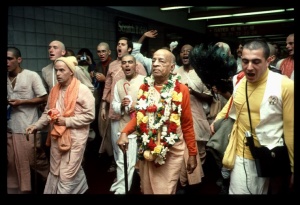CC Madhya 21.58 (1975): Difference between revisions
(Vanibot #0027: CCMirror - Mirror CC's 1996 edition to form a basis for 1975) |
(Vanibot #0020: VersionCompareLinker - added a link to the Version Compare feature) |
||
| Line 2: | Line 2: | ||
<div style="float:left">'''[[Sri Caitanya-caritamrta (1975)|Śrī Caitanya-caritāmṛta (1975)]] - [[CC Madhya (1975)|Madhya-līlā]] - [[CC Madhya 21 (1975)|Chapter 21: The Opulence and Sweetness of Lord Śrī Kṛṣṇa]]'''</div> | <div style="float:left">'''[[Sri Caitanya-caritamrta (1975)|Śrī Caitanya-caritāmṛta (1975)]] - [[CC Madhya (1975)|Madhya-līlā]] - [[CC Madhya 21 (1975)|Chapter 21: The Opulence and Sweetness of Lord Śrī Kṛṣṇa]]'''</div> | ||
<div style="float:right">[[File:Go-previous.png|link=CC Madhya 21.57 (1975)|Madhya-līlā 21.57]] '''[[CC Madhya 21.57 (1975)|Madhya-līlā 21.57]] - [[CC Madhya 21.59 (1975)|Madhya-līlā 21.59]]''' [[File:Go-next.png|link=CC Madhya 21.59 (1975)|Madhya-līlā 21.59]]</div> | <div style="float:right">[[File:Go-previous.png|link=CC Madhya 21.57 (1975)|Madhya-līlā 21.57]] '''[[CC Madhya 21.57 (1975)|Madhya-līlā 21.57]] - [[CC Madhya 21.59 (1975)|Madhya-līlā 21.59]]''' [[File:Go-next.png|link=CC Madhya 21.59 (1975)|Madhya-līlā 21.59]]</div> | ||
{{CompareVersions|CC|Madhya 21.58|CC 1975|CC 1996}} | |||
{{RandomImage}} | {{RandomImage}} | ||
==== TEXT 58 ==== | ==== TEXT 58 ==== | ||
| Line 25: | Line 24: | ||
<div class="translation"> | <div class="translation"> | ||
"Actually it is very difficult to ascertain the number of universes. Every universe has its separate Lord Brahmā and Lord Śiva, who are known as permanent governors. Therefore there is also no counting of them. | |||
</div> | </div> | ||
| Line 32: | Line 31: | ||
<div class="purport"> | <div class="purport"> | ||
Lord Brahmā and Lord Śiva are called cira-loka-pāla, permanent governors. This means that they govern the affairs of the universe from the beginning of the creation to the end. In the next creation, the same living entities may not be present, but because Brahmā and Śiva are existing from the beginning to the end, they are called cira-loka-pāla, permanent governors. Loka-pāla means | Lord Brahmā and Lord Śiva are called cira-loka-pāla, permanent governors. This means that they govern the affairs of the universe from the beginning of the creation to the end. In the next creation, the same living entities may not be present, but because Brahmā and Śiva are existing from the beginning to the end, they are called cira-loka-pāla, permanent governors. Loka-pāla means "predominating deities." There are eight predominating deities of the prominent heavenly planets, and they are Indra, Agni, Yama, Varuṇa, Nirṛti, Vāyu, Kuvera and Śiva. | ||
</div> | </div> | ||
Latest revision as of 13:59, 27 January 2020

A.C. Bhaktivedanta Swami Prabhupada
TEXT 58
- ananta brahmāṇḍera yata brahmā-rudra-gaṇa
- cira-loka-pāla-śabde tāhāra gaṇana
SYNONYMS
ananta—unlimited; brahmāṇḍera—of the universes; yata—all; brahmā—Lord Brahmās; rudra-gaṇa—and Lord Śivas; cira-loka-pāla—permanent governors of the worlds; śabde—by the word; tāhāra—of them; gaṇana—counting.
TRANSLATION
"Actually it is very difficult to ascertain the number of universes. Every universe has its separate Lord Brahmā and Lord Śiva, who are known as permanent governors. Therefore there is also no counting of them.
PURPORT
Lord Brahmā and Lord Śiva are called cira-loka-pāla, permanent governors. This means that they govern the affairs of the universe from the beginning of the creation to the end. In the next creation, the same living entities may not be present, but because Brahmā and Śiva are existing from the beginning to the end, they are called cira-loka-pāla, permanent governors. Loka-pāla means "predominating deities." There are eight predominating deities of the prominent heavenly planets, and they are Indra, Agni, Yama, Varuṇa, Nirṛti, Vāyu, Kuvera and Śiva.